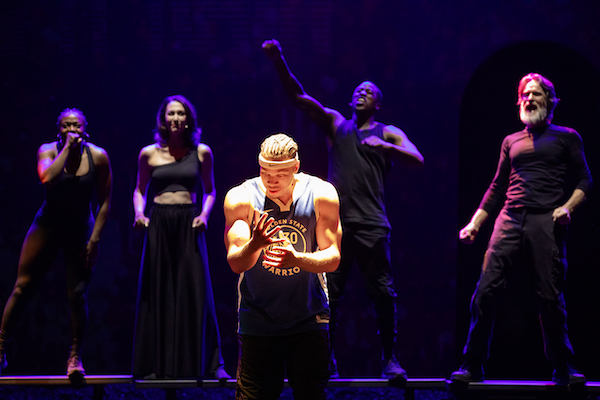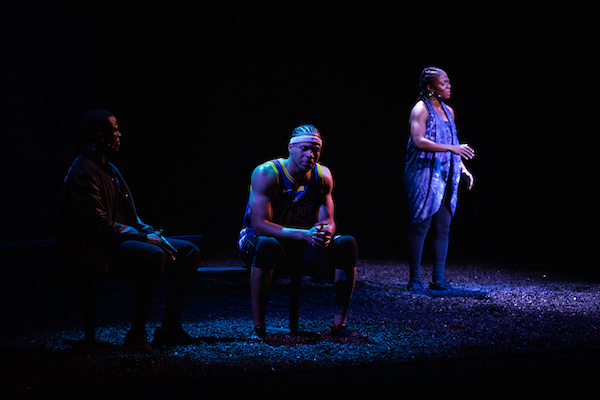Theater Review: “The Half-God of Rainfall” — A Quicksilver Epic
By David Greenham
The Half-God of Rainfall is a challenging journey relayed in a memorable production that will resonate with you for a long time.
The Half-God of Rainfall by Inua Ellams. Directed by Taibi Magar. Movement direction by Orlando Pabotoy. Scenic design by Riccardo Hernández. Costume design by Linda Cho. A co-production of American Repertory Theater and New York Theatre Workshop, staged at the Loeb Drama Center, Cambridge, through September 24.

Jennifer Mogbock and Michael Laurence in The Half-God of Rainfall at the American Repertory Theater, a co-production with New York Theatre Workshop. Credit: Lauren Miller
In his notes about his play, Nigerian-born Inua Ellams traces the origins of this expansive theatrical tale to his school days in Ireland. He was a fledgling basketball player, but he had an insatiable drive to reach a higher level: “I darted down the court, keeping pace with the opposing team until they scored and the ball was in my hands. I dribbled down the right side, crossed over to lose my man and, way too far from the rim, gathered all my strength, willed my mutant genes to manifest yet again, took a shot, and watched the ball soar.”
The opening moments suggest that The Half-God of Rainfall will be a story about “mutant genes,” albeit super-naturalized. The protagonist is Demi (Mister Fitzgerald), a half-god. He’s the son of Zeus (Michael Laurence), the Greek god of thunder, and Modúpé (Jennifer Mogbock), a Nigerian mortal. Young Demi’s powers make him a pinpoint shooter on the basketball court. But whenever he’s sad enough to cry, his half-god tears cause rivers to overflow their banks.
He plays and plays, eventually making his way to the NBA where he becomes the point guard for the Golden State Warriors. In one triumphant moment, he hits the winning shot in the 2009 NBA finals to win the championship. (No, the Warriors didn’t make the playoffs that year.)
Demi’s final test comes in the early rounds of the 2012 London Olympics when Nigeria faces the mighty American team. Nigeria was blown out (by 75 points) by the contender who would eventually win the event’s gold medalists.

Jennifer Mogbock, Kelley Curran, Mister Fitzgerald, Jason Bowen, and Michael Laurence in The Half-God of Rainfall at American Repertory Theater, a co-production with New York Theatre Workshop. Photo: Lauren Miller
Ellams’ script uses Demi as a jumping-off point for a sweeping dramatic excursion. Three types of gods are integrated into the wide-ranging narrative. Zeus, and Hera (Kelley Curran) represent the mighty Greek gods. Ṣàngó (Jason Bowen), Osún (Patrice Johnson Chevannes), and Elegba (Russell G. Jones) represent the gods who frequent the Yoruba spirit world of Western Africa. And Nigerian-born Hakeem ‘The Dream’ Olajuwon (also Jones) represents our most prominent form of gods — professional athletes. With a ‘hoops’ theme, references are made to Allen Iverson, Reggie Miller, Alonzo Mourning, Dennis Rodman, and others. In a fun twist, Olajuwon confirms that many of the great stars of the NBA were/are half-gods like Demi. Only Michael Jordan revealed his status: “Jordan did what no one would dare – he flew,” Olajuwon tells Demi.
The theme of gods grappling for power alone would make for a provocative story. But Ellams has other plans. The Half-God of Rainfall chooses to focus on Demi’s mother, Modúpé, whose heart-breaking experience is an all-too-common tale of mistreatment at the hands of men. The god of thunder, Zeus, faces off against Ṣàngó, the Yoruba warrior linked to fire and lightning. They make a bet on a race and agree that the winner will claim his prize from the loser. Zeus cheats, wins, and determines that Modúpé will be his.
The most gripping section of the production is Zeus’ horrific act and its traumatic repercussions. Modúpé consults with Oṣun (Patrice Johnson Chevannes), the most powerful of the Yoruba deities, linked to water, purity, love, fertility, and sensuality. Demi has to deal with an intractable conflict: the depths of a mother’s love versus the evil act that created his life. Modúpé’s revenge becomes the driving force for the second half of the 90-minute production, and Jennifer Mogbock’s performance of the character’s transformation is deeply moving.
The Half-God of Rainfall is not just complex, but complicated, perhaps too complicated. The playwright relies on an enormous amount of narration; some of it is there just to explain the context of the action. The actors take turns jumping from narrator to character through the play’s three ‘books’ and multiple chapters. Each section is neatly noted along the way, but, like the rivers that seethe when Demi cries, the story sometimes threatens to overflow its banks.

Jason Bowen, Mister Fitzgerald, and Jennifer Mogbock in The Half-God of Rainfall at American Repertory Theater, a co-production with New York Theatre Workshop. Photo: Lauren Miller
The cast of seven, who are all onstage for much of the proceedings, are skillfully collaborative. Director Taibi Magar propels the action at a quicksilver clip. Sometimes things are churning so fast it is hard to keep up. No time to dwell on what is missed is supplied, no quiet moments for reflection. On the one hand, as in sports, momentum in theater matters (particularly given today’s shrinking attention spans). Magar sees that it is as her duty to keep the ball perpetually in play. Still, given the sheer weight of the narrative, maintaining propulsion can be a self-defeating strategy.
Riccardo Hernández set is made up of three large walls — or screens, as it turns out — and a floor of a darker natural substance that looks like it could be a mulch. The walls provide a useful palette for Tal Yarden’s sumptuous projections — both still and in motion — which flow along with the story in ways that help reinforce the emotional tone for each scene. Above the stage sits a large circle — a basketball rim? — that provides an anchor for Stacey Derosier’s sparkling lighting design.
Linda Cho’s costumes are mostly utilitarian. Each actor is garbed in black, which allows them to morph, with the donning of a hat, scarf, or robe, into another character with ease. This is not to say there are not moments of inspired beauty. The costume of Oṣun, the goddess of the river, is eye-poppingly splendid: a gorgeous indigo gown — accented by a Gothic raised collar — that includes a giant cape that nearly covers the stage. When the other actors manipulate the cape to gently flow like a river the visual effect is nothing less than magical.
These technical elements — combined with Mikaal Sulaiman’s well-placed sound, Orlando Pabotoy’s sleek approach to movement, and director Magar’s gorgeous stage pictures — make The Half-God of Rainfall a visual feast.
What’s difficult to overcome at times is the sheer density of the story. There’s the nagging sense that we can’t grasp all that’s going on because everything is whizzing by. Ellams has created an involving, sometimes funny, and always gripping narrative that includes intimations of Greek tragedy, or one of the gargantuan Indian poems, such as the Mahabharata. He has crammed this epic-sized ambition into 90 minutes. Still, there is the suspicion that making the show longer — into two acts — would simply drag things out. The Half-God of Rainfall is challenging journey relayed in a memorable production that will resonate with you for a long time.
David Greenham is an adjunct lecturer of Drama at the University of Maine at Augusta, and is the executive director of the Maine Arts Commission. He has been a theater artist and arts administrator in Maine for more than 30 years.
